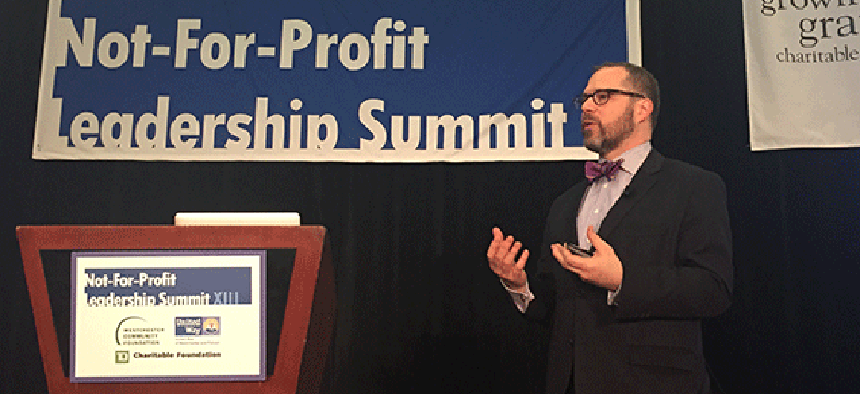Leadership Summit Encourages Collaboration

The Not-for-Profit Leadership Summit XIII was the place to be Monday morning for New York nonprofits. The half-day conference, hosted by the Westchester Community Foundation and the United Way of Westchester and Putnam, offered 18 breakout sessions on topics ranging from telecommuting to social media.
The summit gathered over 700 nonprofit leaders and staffers from throughout downstate New York “to learn new techniques and become more effective at their work,” said Alana Sweeny, president and CEO of United Way of Westchester and Putnam.
"It is critically important for the nonprofit community to come together to build relationships and share best practices," Sweeny said.
However, this year’s summit went beyond offering practical education about running an organization; it challenged attendees to create large-scale, lasting social change through collaboration and coordination—a concept commonly known as “collective impact.”
Keynote speaker Paul Schmitz, CEO of the nonprofit Leading Inside Out, author of “Everyone Leads,” Georgetown University fellow and former adviser to the Obama administration, spoke to the importance of collaboration for success.
“Leadership is a muscle,” Schmitz noted, “a muscle that everyone has. If we’re trying to create change in the community, we have to build that collective leadership muscle.”
Schmitz recounted the events that led to the famous Montgomery, Alabama, bus boycott—a seminal event in the U.S. civil rights movement often attributed solely to Rosa Parks, an activist who refused to give up her seat on a bus. Schmitz introduced the audience to many lesser-known names involved in the boycott: NAACP President E.D. Nixon, who encouraged Parks to become active in advocacy; student Claudette Colvin who was part of Parks’ NAACP Youth Council who, just months before Parks, refused to give up her seat on a bus; white lawyers and advocates Clifford Durr and his wife Virginia Durr, who worked with civil rights attorney Fred Gray to get the anti-segregation case to the Supreme Court.
The work of these many advocates resulted in the Browder v. Gayle ruling, which charged that “the enforced segregation of black and white passengers on motor busses operating in the City of Montgomery violates the Constitution and laws of the United States,” a ruling upheld by the Supreme Court a year later which ultimately desegregated Montgomery buses.
“So, who was the leader of the Montgomery bus boycott?” Schmitz rhetorically asked. “That’s how change happens,” he said. “If you look at any historical movement or social change, it takes leadership from multiples leaders.”
The tremendous impact of nonprofits in New York State was also touted by U.S. Congresswoman Nita Lowey.
“We all know that government can’t do it all,” the congresswoman said as she recounted the summit’s success over the past 13 years, noting that now-presidential candidate Hillary Rodham Clinton attended the inaugural event.
“Every $1 invested to encourage volunteerism produced returns of $1.50 to $3.90 in direct measurable benefits,” Lowey noted, referencing a federal cost-benefit analysis report. “It’s clear that volunteerism helps not only the individuals or communities receiving these services, they yield significant economic benefits.”
NEXT STORY: Sheltering Arms Gala Raises Over $360,000
